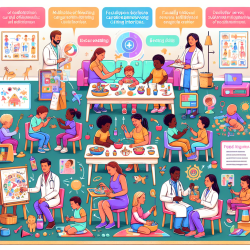Understanding Bullying: A Call for Action
Bullying is a complex issue with significant consequences for those involved. The recent study titled Parents' Awareness of Bullying Involvement in Relation to Physician Practices: Implications for Practice Modifications sheds light on the role healthcare providers play in identifying and addressing bullying. This blog aims to help practitioners enhance their skills by implementing the research findings and encouraging further exploration in this critical area.
Key Findings and Implications
The study compared the practices of pediatric and psychiatry providers in assessing bullying. It found that psychiatry providers reported higher levels of preparedness compared to pediatric providers. This gap highlights the need for targeted training and interventions to improve anti-bullying practices across specialties.
Key findings include:
- Psychiatry providers are more likely to screen for bullying than pediatric providers.
- Both specialties express interest in learning strategies to address bullying.
- Major barriers include lack of training and time constraints.
Practical Steps for Practitioners
To bridge the gap in anti-bullying practices, healthcare providers can take the following steps:
- Enhance Training: Attend workshops and seminars focused on bullying assessment and intervention.
- Implement Routine Screening: Incorporate simple screening questions into regular healthcare visits to identify at-risk patients.
- Educate Parents: Provide educational materials and discuss bullying prevention strategies with parents during visits.
- Collaborate with Schools: Work with educators to develop comprehensive anti-bullying programs and support systems.
Encouraging Further Research
The study underscores the importance of ongoing research to develop effective anti-bullying strategies. Practitioners are encouraged to participate in research initiatives and contribute to the growing body of knowledge on this topic. By staying informed and proactive, healthcare providers can play a pivotal role in preventing bullying and supporting affected individuals.
Conclusion
Bullying remains a significant challenge with far-reaching implications. By implementing the findings from the study and engaging in further research, healthcare providers can enhance their anti-bullying practices and make a positive impact on the lives of children and adolescents.
To read the original research paper, please follow this link: Parents' Awareness of Bullying Involvement in Relation to Physician Practices: Implications for Practice Modifications.










